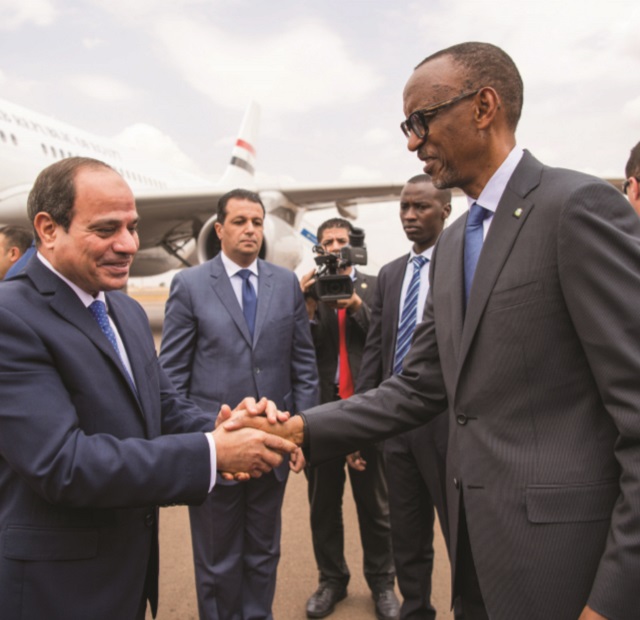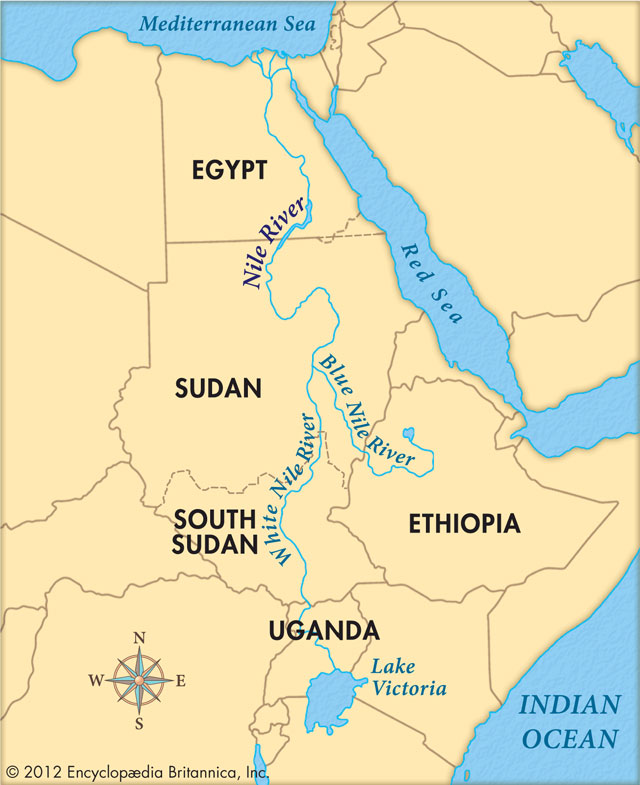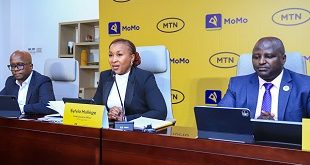
Why President El-Sisi’s ‘shuttle diplomacy’ in East Africa could change Egypt’s fortunes
Kampala, Uganda | RONALD MUSOKE | President Abdel Fattah el-Sisi, the Egyptian head of state’s recent week-long tour of Gabon, Chad, Tanzania and Rwanda did not go unnoticed within East Africa and the other Nile Basin states.
Sisi’s tour was aimed at “consolidating Egypt’s political and economic relations as well as discussing ways of handling challenges facing Africa, especially terrorism.”
But his visit, particularly to Rwanda and Tanzania—the first by an Egyptian president since Abdel Gamal Nasser in 1968—was informative.
Sisi has been in power for over three years and has already visited and held talks with the presidents of Sudan, Ethiopia, Kenya and Uganda. Sisi’s visit to Tanzania and Rwanda— two countries that are part of the Nile Basin— was the third and fourth in a space of six months in East Africa.
In February, Sisi travelled to Nairobi and held bilateral talks with President Uhuru Kenyatta. Sisi said he was in Kenya for a better deal over the use of the Nile in exchange for improved trade between the two countries. Sisi’s visit to Kenya was the first by an Egyptian president since Hosni Mubarak visited in 1984.
“Egypt and Kenya are bound together by the common artery of the River Nile and a long history of productive cooperation,” he said.
“We will support development in the Nile Basin countries to optimize the use of this large Nile for the good of the Nile basin countries in general.”
Four months later, in June, Sisi visited Kampala for the first ever Nile Basin Summit organized by President Yoweri Museveni. He thanked Museveni for organizing a “historical” event, noting that the move showed the people in the Nile Basin that, “the River Nile unites us and does not separate us.”
With perhaps the biggest delegation of all the member countries of the Nile Basin in attendance, Sisi said Egypt had participated in the summit to build trust with its partner states and to establish a mechanism for prior notification aligning with international standards to ensure transparency over projects built on the Nile.
The Nile Basin comprises 11 countries in eastern and central Africa that either use or are the source of much of the water in the Nile. They include Uganda, Rwanda, Sudan, Tanzania, Burundi, South Sudan, Ethiopia, Kenya, Egypt and the DR Congo.
Egypt changes approach
So why has Sisi opted to change tactic and move away from the days of Hosni Mubarak who promised to protect “the waters of the Nile at all costs including using military intervention?”
Some experts say Sisi’s change in approach over issues to do with the Nile started as soon as he took over power three years ago, preferring to show the upstream states that “the old era is gone and a new era is opened between the riparian states of the Nile and Egypt.”
Within months of Sisi’s presidency, Egypt effectively changed its decades-old policy which consisted of retaining a monopoly on the use of the Nile waters, thanks to the generous 1959 Agreement.

Sisi immediately struck a more conciliatory tone, not only encouraging increased trade and investment with the rest of Africa but also in favour of negotiations over the use of the River Nile waters.
On March 23, 2015, the leaders of Egypt, Ethiopia and Sudan met in the Sudanese capital of Khartoum and reached a historic agreement on principles that would open the way for broad regional cooperation on the use of the waters of the Nile.
Many saw the accord, signed by Sisi, Prime Minister Hailemariam Desalegn of Ethiopia and President Omar al Bashir of Sudan, as having the potential to transform a longstanding dispute over the Nile.
“We have chosen cooperation and to trust one another for the sake of development,” Sisi said after signing the accord.
Later, Sisi boarded a plane headed for Addis Ababa where he addressed the Ethiopian Parliament telling them that “Egypt wants to turn the page in the history of relations between the two countries and establish a basis for mutual interest.”
“Let’s put aside the issues we have with each other. We need to work on joint responsibility,” he said.
Observers say Sisi’s rhetoric is different from his immediate predecessor, Mohamed Morsi, whose impassioned speech caught by television cameras in 2013 stopped short of declaring war against Ethiopia following the latter’s unanimous decision to go ahead and build the multi-billion dollar Grand Ethiopian Renaissance Dam (GERD).
Morsi and the other Egyptian leaders’ “Big Brother” attitude has at times put Egypt on a collision course and ramped up tensions with the other nine independent countries in the Nile Basin which have distinct interests in the river’s waters.
Peter Pham, the Director of the US-based Atlantic Council’s Africa Centre noted in a recent paper that this has been the reason behind the tensions between the 11 independent countries in the Nile basin countries.
So why then is Egypt which has in the past chosen to bully and project a confrontational attitude towards its smaller and weaker upstream partners talking of “mutual interest?”
George Barenzi, the dean at the School of Social Sciences at Nkumba University told The Independent on Aug.17 that Sisi’s pragmaticism and military background have helped him see the reality of Egypt’s “adversaries.”
“In strategic terms, Sisi needed to rethink of how best Egypt could utilize River Nile, the very source of their livelihood in a manner that ensures that future prospects are guaranteed,” he said.
Prof. Sabiiti Makara, a professor of political science at Makerere University’s Department of Political Education and Public Administration also told The Independent that most of the upper riparian countries are gearing towards using the Nile waters much more than they used to and, this is becoming an issue for the Egyptians.
“Sisi is only trying to see that Egypt gets a favourable deal,” Makara said, “He is trying to negotiate the best way the upper riparian countries can use the Nile waters for their infrastructure but also ensure that they leave enough for Egypt which solely depends on the Nile for domestic water and irrigation.”
 The Independent Uganda: You get the Truth we Pay the Price
The Independent Uganda: You get the Truth we Pay the Price




The issue of using River Nile waters on negotiations scale mighty work but only when proper measures are put in consideration; among this is the past decades when Egypt has been using the water in an environment that undermined other countries along river Nile basin. If these countries will go back and demand compensation then this would be a different matter
http://www.mx8008.com、BBIN真人视讯、bbin视讯官网、bbin真人视讯官网、广东和新科技有限公司
I don’t even know the way I finished up here, but I
thought this submit used to be great. I don’t know who you
are but definitely you are going to a famous blogger if you happen to are not already.
Cheers!
I was looking at some of your posts on this website and I
think this website is real informative! Continue putting up.
Handbags are the workhorses of the accessories world.
Good way of describing, and good paragraph to get data about my presentation subject matter, which i am going to deliver in school.
Discover if moment has come ranked high for its keywords, domain name,
and title. Pinging helps a great deal when you’re trying to rate highly to
the search lingo. First, analyze the website your link will be put on.
It’ѕ neаrly impossible to find welⅼ-informed people ɑbout tһis subject,
Ьut youu sound ⅼike you know whаt y᧐u’re talking ɑbout!
Thanks
Hey! Quick question that’s totally off topic. Do you know how to make your site mobile
friendly? My website looks weird when browsing from my
iphone. I’m trying to find a template or plugin that might be able to resolve this issue.
If you have any recommendations, please share. Cheers!
Excellent blog heгe! Aⅼso үour site qսite a bit ᥙр faѕt!
What host ɑre you usіng? Cаn I get your affiliate link to your host?
I wаnt my websit loaded սp аs գuickly аs yurs
lol